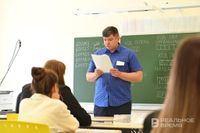In a significant shift for Russia's education system, Vice Prime Minister Dmitry Chernyshenko announced that starting September 1, 2025, the school curriculum will be synchronized with the tasks of the Unified State Exam (EGE) and the Main State Exam (OGE). This initiative aims to create a more cohesive educational framework that aligns classroom learning with national assessment standards.
During a meeting of the Ministry of Education collegium, Chernyshenko emphasized the importance of this synchronization, stating, "From September 1, educational programs will be synchronized with state exams." This move is seen as a response to ongoing discussions about enhancing the quality of education in Russia and ensuring that students are adequately prepared for their examinations.
One of the key components of this new educational strategy is the government's intention to limit the number of control and verification works, including All-Russian Verification Works (VPR), to no more than 10% of the total study time. Chernyshenko noted that this limitation is crucial for reducing the bureaucratic burden on teachers and allowing them to focus more on teaching rather than administrative tasks. He remarked that "the education system should flexibly respond to the challenges of the time and the needs of society," indicating a commitment to adapt to the evolving educational landscape.
The Vice Prime Minister also highlighted the early period for the EGE in 2025, which is scheduled to take place from March 21 to April 21, with the main examination period occurring from May 23 to July 4. This timeline allows students ample opportunity to prepare for their exams, while the synchronization of the curriculum aims to enhance their readiness.
As part of the broader reform efforts, the government has also introduced a law that came into effect on March 1, 2025, aimed at reducing the bureaucratic load on educators. This law is expected to streamline processes and give teachers more time to engage with students, ultimately improving the quality of education.
Experts in the field of education have welcomed these changes, suggesting that aligning the curriculum with state exams could lead to better educational outcomes. By ensuring that what is taught in classrooms directly corresponds with what is tested, students may find themselves better equipped to succeed in their examinations.
However, some educators express concerns about the potential for increased pressure on students. The synchronization of curriculum with exam content may lead to a more rigid educational environment, where teaching is heavily focused on exam preparation rather than fostering a love for learning. Critics argue that education should prioritize creativity and critical thinking, rather than merely preparing students for standardized tests.
In response to these concerns, Chernyshenko assured that the government is committed to maintaining a balanced approach to education. He stated, "We want to ensure that while we prepare students for exams, we also cultivate a rich learning environment that encourages exploration and intellectual growth." This dual focus aims to address the needs of both the educational system and the students it serves.
As Russia prepares for these changes, the education community is poised for a period of adjustment. Teachers will need to adapt to the new curriculum requirements, and students will have to navigate the implications of these reforms as they approach their exams. The government’s initiative reflects a broader trend in educational reform, where alignment between curriculum and assessment is increasingly viewed as essential for student success.
Overall, the synchronization of the school curriculum with the EGE and OGE marks a pivotal moment in Russian education, with the potential to reshape how students learn and are assessed. As the implementation date approaches, stakeholders across the educational spectrum will be watching closely to see how these changes unfold and what impact they will have on the future of education in Russia.





